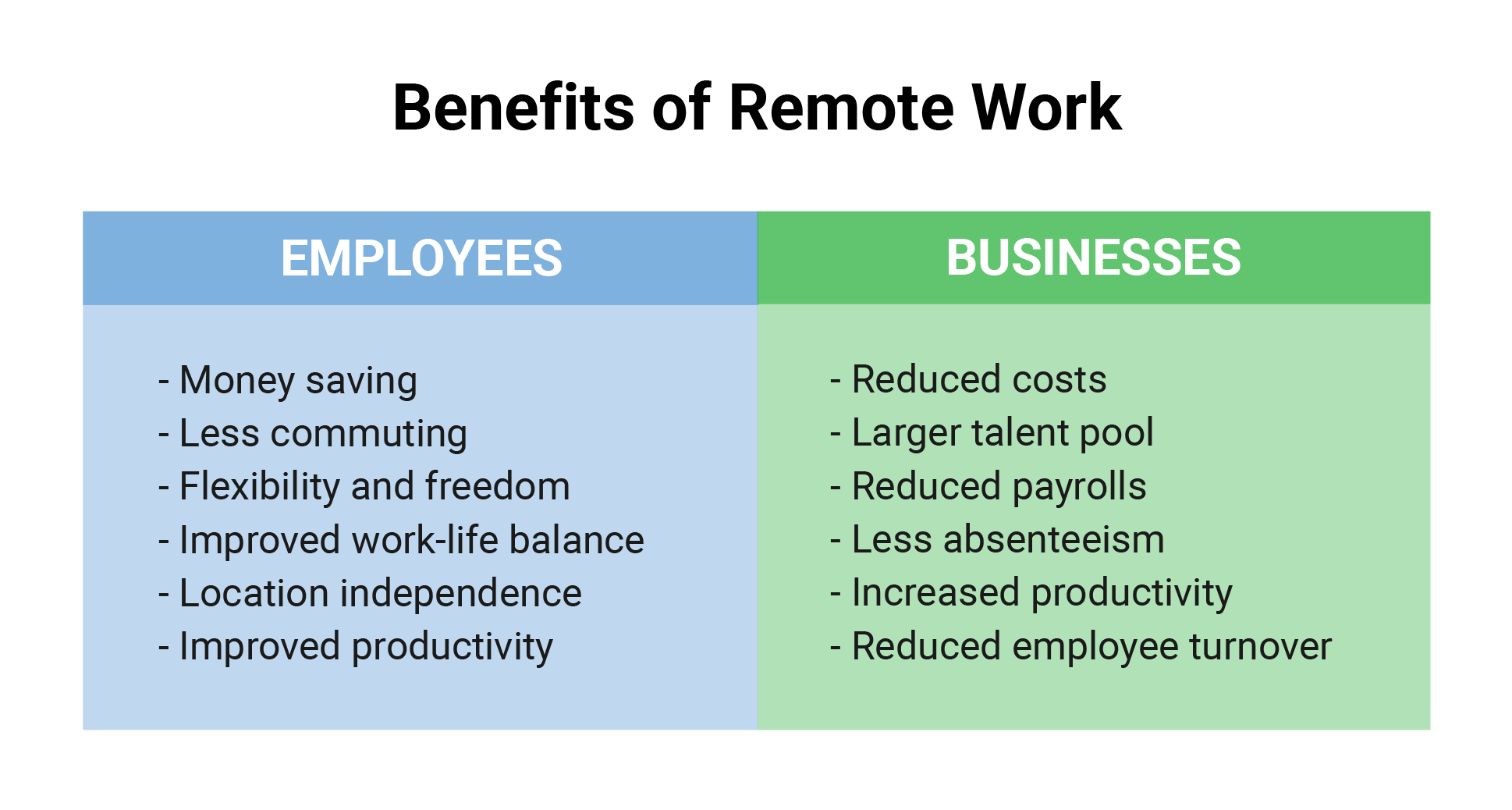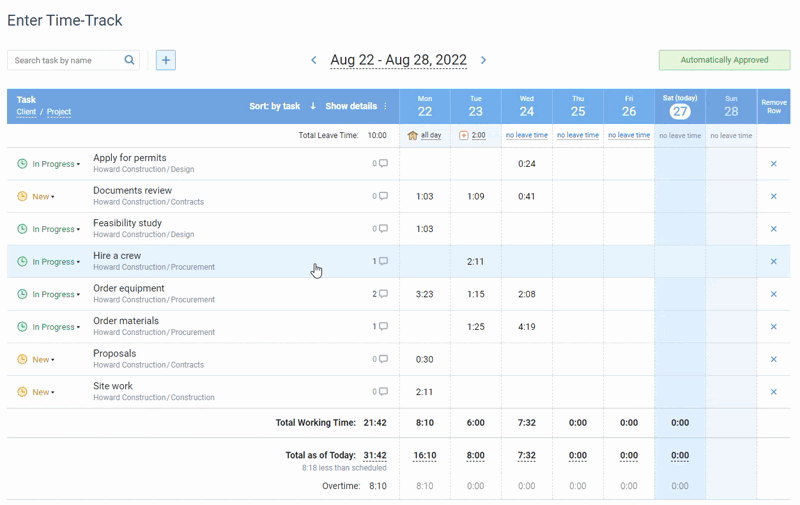
The number of people working remotely had been seeing a steady rise since 2008 until the global pandemic happened and made it an enforced trend. To job seekers, remote work provides greater control over their private lives, careers and overall well-being. At the same time, businesses still hesitate to allow remote working after the pandemic is over.
In this article, we’d like to list the key remote work benefits for businesses and employees and supply them with statistical evidence. Here’s a list of items that we are going to cover below.

Remote Work Benefits For Businesses
1. Cost saving
According to Global WorkplaceAnalytics, cost savings is the number one remote work benefit of telecommuting for employers. They include the following:
- Real estate needs. If you cut the number of office workers or limit hot desks in the office, you can cut office space as well and move to a more tiny one. Property is one of the tax burdens that you can minimize by moving most of your staff to their home offices, renting smaller offices and introducing hot desking.
- Workplace and utility needs. Remote workers reduce the costs related to their workplace such as equipment, supplies, water, electricity, heating.
- Catering and cleaning services. The fewer people work in the office, the less are your catering and cleaning bills. These include cafeteria service and office snacks.
- Furniture and equipment.
- Healthcare. People working from home get sick less often, meaning less health insurance costs for your business.
“A single company can annually save $11,000 per remote worker who telecommutes 50% of the time” – Global Workplace Analytics
Cost-saving opportunities for business are really impressive, but remote work benefits for employers don’t end here.
2. Increased productivity
One of the biggest fears about managing remote workers is having doubts about their performance. But a two-year study by Stanford University revealed the opposite: remote employees are 13% more productive meaning nearly an extra day of output per week.
“75% of employees feel that they have maintained or improved their productivity during the remote work caused by the pandemic” – Boston Consulting Group
The reasons for increased productivity may include less gossip time, distractions, and a more comfortable environment. Additionally, remote workers don’t have to daily commute meaning less rush-hour and tardiness-related stress, having a negative impact on focus and concentration abilities.
3. Reduced payrolls
Businesses are looking for more ways to cut their costs and are discussing the possibility to adjust salaries for employees who want to work remotely, especially if they want to move to locations with a lower cost of living.
“Two-thirds of tech-workers would consider moving away from the pricey areas if they could work remotely” – Business Insider
Global Workplace Analytics reveals another interesting insight: almost one-third of employees would prefer work from home to a pay raise. Respondents state that a pay raise won’t cover their commute, eating out, business attire and other expenses. While some of them just value flexibility and having more spare time, which is irretrievable.
Both examples are great ideas that you can discuss with your employees to create a win-win situation where you offer them telecommuting in exchange for a payroll cut.
4. Reduced employee turnover
Every business knows the value of employee retention. Every time an employee leaves the company, it means that the company loses skills, experience and knowledge and has to invest resources into replacing and training a new employee. According to SHRM, for each employee lost, the cost to the company could be 50%–250% of their annual salary.
“Remote employees are 13% more likely to remain with a single employer for longer than office-based workers” – Owl Labs
When you provide employees with an opportunity to work from home and give them the flexibility that comes with it, it increases their loyalty, trust and satisfaction. That results in higher employee retention, which is a goal for any business out there.
5. Reduction in absenteeism
First of all, remote work reduces the number of sick leaves. Office workers who feel under the weather call in sick more often than remote employees. The reason for this is that office workers need to spend time commuting to work and back when feeling unwell, while remote workers can rest any time when they need to. Remote employees also recover from illness and get back to work faster.
“Highly engaged flexible workplaces claim 41% lower absenteeism” – Gallup
The same applies to taking time off for doctor appointments, childcare needs and other reasons. Remote employees can squeeze these events into their schedules without taking an unnecessary leave of absence.
6. Wider talent pool
Hiring for remote positions removes geographical boundaries and opens the gate for a wider variety of talents around the world. Remote work is a strong selling point towards attracting highly qualified candidates from markets outside your own. This approach to recruiting talents prioritizes aptitude, widens the hiring net and allows managers to evaluate candidates in an entirely virtual environment.
“Ethnically and culturally diverse executive teams are 33% more profitable” – McKinsey & Company
Remote employees will prove the most useful to the companies who are looking to have a greater presence in other regions with other cultures and languages. As remote work proved to increase employee satisfaction and productivity, they will do their best to have a remote dream job without relocating and leaving their families to work with you.
Remote Work Benefits For Employees
1. Freedom and flexibility
Recently, Buffer published its annual State of Remote Work report highlighting the benefits and struggles of remote work for employees. 57% of respondents stated that flexibility in terms of schedule and location is the biggest remote work benefit for them.
It’s no wonder that remote workers appreciate their flexibility and freedom. Employees can plan their day to balance work and home life, attend medical appointments, watch the kids or take care of their elderly parents without asking for time off or asking permission. This kind of working relationship builds trust and improves job satisfaction.
2. Cost saving
Office-based work not only robs employees of their time but also of great sums of money. These expenses include the following:
- Commuting costs. The average commuter spends between $2,000 and $5,000 per year on transportation costs.
- Clothes and fashion. Office work requires “business casual” clothes, paying for stitching and dry cleaning, haircut refreshing, visiting salons.
- Food. Eating out for lunch, ordering food and visiting coffee shops can add up fast.
- Dependants. These include care services for children, elders and pets.
“The average remote worker saves $4,000 per year by not spending money on gas, coffee, lunches and more clothes for their wardrobe” – FlexJobs
Remote workers pay less to none for transportation, car maintenance, professional wardrobe and eating out. They can coordinate their schedules with their parents and spouses to take care of their children, elders and pets and save on caregiving services. For every penny they save, they have an extra penny.
3. Time saving
Lack of commute is one of the main remote work benefits. Lack of commute saves precious time and money, improves overall happiness and work-life balance.
“Compared to office employees, remote employees save an average of 8.5 hours of free time per week, which equals about 442 hours annually” – Airtasker
More than that, with remote work, employees no longer need to pick out what to wear, pack lunch boxes, take clothes to the laundry and participate in office gossip. Telecommuting allows employees to eliminate unnecessary routines and distractions, and provides them with more control over their time.
4. Location independence
Permanent remote work gives employees location independence and the opportunity to work from anywhere in the world. Two-thirds of tech workers from San Francisco Bay Area reported that they’d move to regions with a lower cost of living and traffic issues if they were given the option.
“Facebook’s company survey: about 60% of employees said they’d prefer to move to a smaller city or town” – MarketWatch
The location independence trend is likely to increase in the next few years. Upwork predicts that the majority of the U.S. workforce will be location-independent by 2027.
5. Improved productivity and wellbeing
It’s no secret that the office environment can be noisy and distracting: phones are ringing, people are talking, and there’s a general buzz. Many people, especially knowledge workers, need silence to focus at work, which is not possible in a traditional office environment. More than that, researches prove that noise reduces our concentration significantly.
“86% of telecommuters said they felt better and were more productive when they work from home” – SHRM
Remote work gives employees the opportunity to customize their surroundings to suit their personal needs, get comfortable with their preferred outfits and tech setup, and take care of physical and emotional needs as they come up. Whenever they feel unwell, they can lie down or even take a nap on the couch or in bed anytime – have that degree of self-care and comfort that most offices don’t provide.
6. Improved work-life balance
Work-life balance is one of the most attractive perks of remote work for employees. A recent FlexJobs survey revealed that 73% of telecommuters noticed the improvement of their work-life balance because its flexibility allowed them to spend more time with their children, partner and pets.
“68% of employees say poor work-life balance negatively impacts their morale and motivation at work” – Fingerprint for Success
Besides that, remote work eliminates the need to rush to catch a train or sit in traffic and follow stressful office politics. Instead, remote workers get more family time, take more breaks, feel more relaxed and perform better.
Ready to Maximize Remote Work Benefits?
Employment forecast made by the World Economic Forum called flexible work, including the opportunity to work from home “one of the biggest drivers of transformation” in the modern workplace. Modern technology allows businesses to manage remote teams as effectively as an office-based one, saving costs and attracting the top talents from over the world.
If you are looking for an employee-friendly solution to keep project progress, resource distribution, costs and expenses in check, consider actiTIME.

Online timesheet interface in actiTIME where every user can select task parameters
they want to see in their timesheets
It makes a good addition to remote teams with well-established project management processes without introducing employee monitoring practices. Get your free 30-day trial to explore actiTIME functionality (no credit card required).

















































